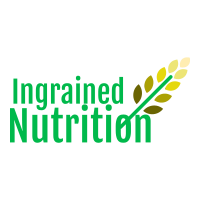Last week Australia shined a spotlight on International women’s day (Whop Whop!) and with March being National Endometriosis awareness month, we thought we would highlight the ever confusing condition: Endometriosis.
This complex condition is poorly understood. With lots of confusion around what you should be eating if you have endo.
What’s Endo?
According to Endometriosis Australia, Endometriosis is where the tissue that surrounds your uterus starts to spread to other areas of the body.
As many as 1 in 10 women may have endometriosis. Some of the many symptoms include pain around your period or ovulation, pain in your lower back and legs, pain when you go to the toilet, tiredness or heavy bleeding.
There is much confusion around what to eat. So lets see what the research says….
When to fruit and veg and when to not?
Even though we have been told over and over again to eat our two fruit and five vegetables, it appears that the more fruit and vegetables you eat, your risk of developing endometriosis lessens.
The best fruits to consume are citruses. Citruse fruits contain vitamin C and A. Vitamin C and A are antioxidants that help fight the stress and inflammation caused in your body from endo. This is particularly important, as most women who have endometriosis have low Vitamin A levels.
These could include foods like:
- Oranges
- Limes
- Grapefruit
- Lemons
- Tangerines

Pimp your greens!
Increasing your green vegetables also helps to reduce the risk of endometriosis. Try hiding grated zucchini in your spaghetti or bulking up your sandwich with some spinach.
Other green veges include:
- Spinach
- Broccoli
- Broccolini
- Peas
- Green beans
- Snow peas
- Capsicum

But, then which veges should I eat less of?
Some IBS (irritable bowel syndrome) symptoms have been linked to endometriosis.
If you are experiencing bloating, wind, or pain from abdominal cramps avoiding some of these High Fodmap foods like cruciferous vegetables may be helpful. As these High Fodmap foods tend to sit in the large bowel and ferment causing gas and bloating.
This could be vegetables like:
- Cabbage
- Peas
- Asparagus
- Mushrooms
- Cauliflower
- Onion and garlic
If you experiencing any of these syptoms see your local dietitian today.
Which meats should I eat more of and which should I reduce?
Something smells fishy….
Increasing oily fish (salmon or tuna) helps reduce the risk of endometriosis. Fish contains omega 3 fatty acids which can help reduce inflammation caused by endo.
It is suggested that people should aim to eat around 120g of fish, two or three times a week.
Some ways you could include fish in your diet could be including tinned salmon or tuna on salad or baking salmon with vegetables.
Other white meats such as chicken don’t have an impact on endometriosis, so eat up! (4)

Reduce your red meat !
Reducing your servings of red meat also reduces your risk of endometriosis. One study found that women eating more than 2 servings of red meat are more are likely to have endometriosis. (4)
When eating red meat, one serving should be about the size of your palm.
Other processed meats such as ham and salami shouldn’t be consumed as part of a healthy diet due to the high amounts of bad fats. Some research shows that eating these foods increases your risk of endometriosis. (4)
What else can I do?
Fight with Fibre!
Women with endometriosis often have higher levels of estrogen. During our menstruation cycle, the hormone estrogen is realised around ovulation. (7)
High Levels of estrogen can cause inflammation and severe pain, especially in women who have endometriosis.
High fibre foods can help us reduce estrogen by helping us become more regular on the toilet.
As a bonus, these high fibre foods also contain antioxidants that help fight inflammation. So fight endo with fibre!
High fibre food includes:
– Legumes and lentils
– Wholegrain cereals (Brown rice, wholegrain bread, crackers and pasta)
– Fruits and vegetables.
Is coffee okay to drink?
Those who need this essential drink to wake in the morning may be asking this very question.
The answer is it appears to be okay. The research found that drinking caffeine appeared to not have an effect on endometriosis. (6)

Key take home messages:
- Focus on citrus fruits and green vegetables.
- Embrace oily fish eg salmon and tuna
- Reduce red and processed meats eg steak, ham, salami
- Fight with Fibre: Wholegrains, legumes, fruit and vegetables.
- And… coffee is okay to drink!
For more information about Endometriosis visit Endometriosis Australia. https://www.endometriosisaustralia.org/
Or make a booking to see a dietitian today at Ingrained Nutrition.
By Emma Pearson, Accredited Practising Dietitian
- H R Harris, A C Eke, J E Chavarro, S A Missmer, Fruit and vegetable consumption and risk of endometriosis, Human Reproduction, Volume 33, Issue 4, April 2018, Pages 715–727, https://doi.org/10.1093/humrep/dey014
- Fabio Parazzini, Paola Viganò, Massimo Candiani, Luigi Fedele, Diet and endometriosis risk: A literature review, Reproductive BioMedicine Online, Volume 26, Issue 4,2013,Pages 323-336,
- Yamamoto A, Harris HR, Vitonis AF, Chavarro JE, Missmer SA. A prospective cohort study of meat and fish consumption and endometriosis risk. Am J Obstet Gynecol. 2018 Aug;219(2):178.e1-178.e10. doi: 10.1016/j.ajog.2018.05.034. Epub 2018 Jun 2. PMID: 29870739; PMCID: PMC6066416.
- F. Parazzini, F. Chiaffarino, M. Surace, L. Chatenoud, S. Cipriani, V. Chiantera, G. Benzi, L. Fedele, Selected food intake and risk of endometriosis, Human Reproduction, Volume 19, Issue 8, August 2004, Pages 1755–1759,
- Chiaffarino F, Bravi F, Cipriani S, Parazzini F, Ricci E, Viganò P, La Vecchia C. Coffee and caffeine intake and risk of endometriosis: a meta-analysis. Eur J Nutr. 2014 Oct;53(7):1573-9. doi: 10.1007/s00394-014-0662-7. Epub 2014 Jan 31. PMID: 24481690.
- Armstrong BK, Brown JB, Clarke HT, Crooke DK, Hähnel R, Masarei JR, Ratajczak T. Diet and reproductive hormones: a study of vegetarian and nonvegetarian postmenopausal women. J Natl Cancer Inst. 1981 Oct;67(4):761-7. PMID: 6944545
.




